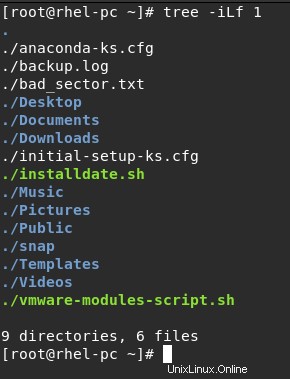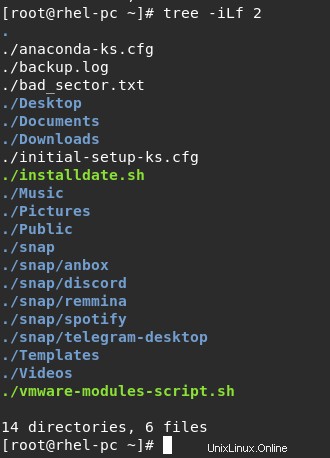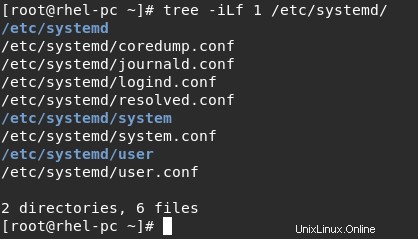Hola chicos, en este artículo les mostraremos cómo contar la cantidad de archivos y subdirectorios en un directorio usando un comando de árbol.
Contar el número de archivos y directorios con el comando de árbol :
- El árbol El comando funcionará incluso si no se proporcionan argumentos, como se muestra a continuación:
tree -iLf 1
- “-i” :permite que el árbol imprima líneas de sangría.
- “-L” :especifica el nivel de profundidad del árbol de directorios que se mostrará, que en el caso anterior es 1 .
- “-f” :hace que el árbol imprima el prefijo de la ruta completa para cada archivo.
- Si desea ver la misma información sin argumentos para el nivel de profundidad 2:
tree -iLf 2
- También si desea ver la misma información pero para un directorio específico.
Por ejemplo: /etc/systemd/
tree -iLf 1 /etc/systemd/Salida de muestra :
[root@rhel-pc ~]# tree -iLf 1 /etc/systemd/
/etc/systemd
/etc/systemd/coredump.conf
/etc/systemd/journald.conf
/etc/systemd/logind.conf
/etc/systemd/resolved.conf
/etc/systemd/system
/etc/systemd/system.conf
/etc/systemd/user
/etc/systemd/user.conf
2 directories, 6 files
[root@rhel-pc ~]# 
- Para ver la información del directorio anterior pero con nivel de profundidad 2
tree -iLf 2 /etc/systemd/Salida de muestra:
[root@rhel-pc ~]# tree -iLf 2 /etc/systemd/
/etc/systemd
/etc/systemd/coredump.conf
/etc/systemd/journald.conf
/etc/systemd/logind.conf
/etc/systemd/resolved.conf
/etc/systemd/system
/etc/systemd/system/basic.target.wants
/etc/systemd/system/bluetooth.target.wants
/etc/systemd/system/dbus-org.bluez.service -> /usr/lib/systemd/system/bluetooth.service
/etc/systemd/system/dbus-org.fedoraproject.FirewallD1.service -> /usr/lib/systemd/system/firewalld.service
/etc/systemd/system/dbus-org.freedesktop.Avahi.service -> /usr/lib/systemd/system/avahi-daemon.service
/etc/systemd/system/dbus-org.freedesktop.ModemManager1.service -> /usr/lib/systemd/system/ModemManager.service
/etc/systemd/system/dbus-org.freedesktop.nm-dispatcher.service -> /usr/lib/systemd/system/NetworkManager-dispatcher.service
/etc/systemd/system/dbus-org.freedesktop.timedate1.service -> /usr/lib/systemd/system/timedatex.service
/etc/systemd/system/default.target -> /usr/lib/systemd/system/graphical.target
/etc/systemd/system/default.target.wants
/etc/systemd/system/dev-virtio\x2dports-org.qemu.guest_agent.0.device.wants
/etc/systemd/system/display-manager.service -> /usr/lib/systemd/system/gdm.service
/etc/systemd/system/getty.target.wants
/etc/systemd/system/graphical.target.wants
/etc/systemd/system/local-fs.target.wants
/etc/systemd/system/multi-user.target.wants
/etc/systemd/system/network-online.target.wants
/etc/systemd/system/printer.target.wants
/etc/systemd/system/remote-fs.target.wants
/etc/systemd/system/snap.remmina.ssh-agent.service
/etc/systemd/system/sockets.target.wants
/etc/systemd/system/sysinit.target.wants
/etc/systemd/system/syslog.service -> /usr/lib/systemd/system/rsyslog.service
/etc/systemd/system/sysstat.service.wants
/etc/systemd/system/systemd-timedated.service -> /dev/null
/etc/systemd/system/timers.target.wants
/etc/systemd/system/var-lib-snapd-snap-bare-5.mount
/etc/systemd/system/var-lib-snapd-snap-core-11993.mount
/etc/systemd/system/var-lib-snapd-snap-core18-2284.mount
/etc/systemd/system/var-lib-snapd-snap-core20-1270.mount
/etc/systemd/system/var-lib-snapd-snap-discord-131.mount
/etc/systemd/system/var-lib-snapd-snap-gnome\x2d3\x2d28\x2d1804-161.mount
/etc/systemd/system/var-lib-snapd-snap-gnome\x2d3\x2d38\x2d2004-87.mount
/etc/systemd/system/var-lib-snapd-snap-gtk\x2dcommon\x2dthemes-1519.mount
/etc/systemd/system/var-lib-snapd-snap-remmina-5130.mount
/etc/systemd/system/var-lib-snapd-snap-snapd-14295.mount
/etc/systemd/system/var-lib-snapd-snap-spotify-56.mount
/etc/systemd/system/var-lib-snapd-snap-telegram\x2ddesktop-3544.mount
/etc/systemd/system/vmtoolsd.service.requires
/etc/systemd/system.conf
/etc/systemd/user
/etc/systemd/user/dbus-org.bluez.obex.service -> /usr/lib/systemd/user/obex.service
/etc/systemd/user/default.target.wants
/etc/systemd/user/sockets.target.wants
/etc/systemd/user.conf
20 directories, 30 files
[root@rhel-pc ~]# Como puede ver en el resultado anterior, después de enumerar todos los archivos y subdirectorios, árbol le muestra el número total de directorios y archivos en el directorio que especificó y los valores no serán los mismos cuando el nivel de profundidad sea diferente.
Conclusión
Eso es todo...
En este artículo ilustramos cómo contar la cantidad de archivos y subdirectorios en un directorio.
herramientas terminales